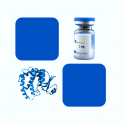
- Remove this product from my favorite's list.
- Add this product to my list of favorites.
Products
Newsletter
 |  |  |  |  |  |

Background
Cluster of Differentiation 86 (CD86) is also known as B-lymphocyte activation antigen B7-2, is a type I membrane protein that is a member of the immunoglobulin superfamily, and is constitutively expressed on interdigitating dendritic cells, Langerhans cells, peripheral blood dendritic cells, memory B cells, and germinal center B cells. Additionally, B72 is expressed at low levels on monocytes and can be upregulated through interferon γ. CD86 is the ligand for two different proteins on the T cell surface: CD28 (for autoregulation and intercellular association) and CTLA-4 (for attenuation of regulation and cellular disassociation). CD86 works in tandem with CD80 to prime T cells. Recent study has revealed that B7-2 promotes the generation of a mature APC repertoire and promotes APC function and survival. Furthermore, the B7 proteins are also involved in innate immune responses by activating NF-κB-signaling pathway in macrophages. CD86 thus is regarded as a promising candidate for immune therapy. CD86+ macrophages in Hodgkin lymphoma patients are an independent marker for potential nonresponse to firstline-therapy.
Source
Recombinant Cynomolgus / Rhesus macaque B7-2, Fc Tag (CD6-C5254) is expressed from human 293 cells (HEK293). It contains AA Ala 19 - His 240 (Accession # G7NXR4). In the region Ala 19 - His 240, the AA sequence of Cynomolgus and Rhesus macaque B7-2 are homologus.
Predicted N-terminus: Ala 19
Molecular Characterization
This protein carries a human IgG1 Fc tag at the C-terminus.
The protein has a calculated MW of 52 kDa. The protein migrates as 76-100 kDa under reducing (R) condition (SDS-PAGE) due to glycosylation.
Endotoxin
Less than 1.0 EU per μg by the LAL method.
Purity
95% as determined by SDS-PAGE.
Formulation
Lyophilized from 0.22 μm filtered solution in Tris with Glycine, Arginine and NaCl, pH7.5. Normally trehalose is added as protectant before lyophilization.
Reconstitution
See Certificate of Analysis for details of reconstitution instruction and specific concentration.
Storage
For long term storage, the product should be stored at lyophilized state at -20°C or lower.
Please avoid repeated freeze-thaw cycles.
This product is stable after storage at:
-20°C to -70°C for 12 months in lyophilized state;
-70°C for 3 months under sterile conditions after reconstitution.
Bioactivity
Please refer to product data sheet.
(1) "Soluble CTLA-4 mutants ameliorate immune-related adverse events but preserve efficacy of CTLA-4- and PD-1-targeted immunotherapy"
Liu, Wang, Du et al
Sci Transl Med (2023) 15 (685), eabm5663
(2) "In silico engineering a CD80 variant with increased affinity to CTLA-4 and decreased affinity to CD28 for optimized cancer immunotherapy"
Hajihassan, Afsharian, Ansari-Pour
J Immunol Methods (2023) 513, 113425
(3) "CHI3L1 enhances melanoma lung metastasis via regulation of T cell co-stimulators and CTLA-4/B7 axis"
Ma, Kamle, Akosman et al
Front Immunol (2022) 13, 1056397
Showing 1-3 of 4765 papers.
Recombinant human B7-2 / CD86 Protein, Fc tag (MALS verified), 200µg - 442,00 €
Recombinant Human B7-2 / CD86 Protein, His tag (MALS verified), 100µg - 364,00 €
Recombinant Mouse B7-2 / CD86 Protein, Fc Tag (MALS verified), 100µg - 234,00 €
Recombinant Mouse B7-2 / CD86 Protein, His Tag (MALS verified),100µg - 234,00 €
Welcome Login
Contact us
Follow us